A good digital marketing strategy is crucial for businesses to stand out in today's competitive environment. The creation of unique content boosts brand visibility and sales. By using digital marketing tactics, businesses can get their message out there and reach more customers.
However, keeping up with the latest digital marketing trends is essential for success. As technology evolves, new strategies and techniques are emerging. Therefore, companies must stay current with the latest trends and adapt their marketing strategies accordingly.
What Is A Digital Marketing Strategy?
A digital marketing strategy is a comprehensive plan that outlines how a business can leverage digital channels to achieve its marketing goals. It’s a crucial aspect of any business looking to expand its reach and increase its online presence.
It encompasses a range of activities that are designed to promote products or services through digital channels such as social media, SEO, email marketing, and more.
Well-crafted digital strategies can help businesses increase brand awareness, generate leads, and drive conversions. With the rise of digital technologies, businesses can reach their target audience more effectively than ever before.
Marketing Strategy vs Tactics vs Campaigns
It's important to understand the difference between marketing strategy, tactics, and campaigns to create an effective digital marketing plan.
A marketing strategy refers to a long-term plan that sets the overall direction and goals for the marketing efforts. Digital marketing tactics, on the other hand, are the specific actions taken to achieve those goals. Finally, campaigns are short-term efforts that focus on achieving specific objectives within a timeframe.
By understanding these differences, businesses can create an internet marketing strategy that aligns with their overall marketing objectives and drives measurable results.
Types of Digital Marketing Strategies & Examples
Digital marketing strategy is an essential aspect of any successful business, enabling companies to connect with their target audience through various digital channels.
There are multiple types of digital marketing strategies that can be used to achieve marketing goals and drive business growth. Here are a few examples:
- Search Engine Optimization (SEO): a strategy that helps businesses rank higher on search engine results pages
- Social Media Marketing: a popular strategy that leverages social media platforms to create brand awareness and engage with customers
- Pay-per-click (PPC) Advertising: a type of digital marketing strategy that enables businesses to drive traffic to their website by paying for ads.
- Content Marketing: utilizing online content to build brand awareness and attract audiences and buyers
Overall, identifying the right digital marketing strategy for your business can help you meet your marketing goals and achieve success in today's competitive digital landscape.
Importance Of Having A Digital Marketing Plan
Building a digital marketing strategy can be challenging, but investing the time and effort to create it can result in several crucial benefits.
Gives You Direction
Without a clear direction, it is easy to get lost in the sea of online marketing strategies and lose sight of your goals.
A well-crafted digital marketing plan provides a roadmap to help you navigate through the complexities of the online world. It outlines the key digital marketing strategies that you need to implement to achieve your objectives, whether it's increasing website traffic, generating leads, or boosting sales.
With a digital marketing plan in place, you can focus on executing your strategies effectively and efficiently, resulting in measurable success.
Amplifies Your Message And Aligns Your Efforts
If you want to make a powerful impact on your target audience, having a digital marketing plan is crucial. With the right digital marketing strategies, you can amplify your message and reach more people than ever before.
Creating an effective digital marketing plan isn't just about posting on social media or sending out email campaigns. It's about aligning your efforts so that every aspect of your online marketing strategy works together seamlessly. By doing this, you can create a cohesive brand message that resonates with your target audience and encourages them to take action.
So, if you're serious about growing your business and reaching more customers, it's time to invest in a digital marketing plan. With the right approach and a little bit of creativity, you can make a big impact online and achieve all of your business goals.
Maximize Every Channel
In today's digital age, having a strong online presence is crucial for the success of any business. To achieve this, you need to have a well-planned digital marketing strategy that can help you maximize your digital channels. Whether it's social media, email marketing, or search engine optimization (SEO), your strategy should be designed to promote your brand and reach your target audience effectively.
By implementing effective advertising strategies and internet marketing strategies, you can not only increase your brand awareness but also generate leads and conversions. With the right strategy in place, you can attract more customers to your website, engage with them through valuable content, and ultimately convert them into loyal customers.
Cultivates Agility
With the ever-evolving landscape of digital strategies and digital marketing methods, it's important to have a plan in place that allows you to become agile and adapt quickly. One of the biggest benefits of having a digital marketing strategy is the ability to respond quickly to changes in the market. With traditional marketing methods, it can take months to create and launch a campaign.
In contrast, digital marketing strategies allow you to quickly analyze data and make adjustments on the fly. This means that you can respond to new trends and emerging technologies faster than your competitors, giving you a significant advantage in the marketplace.
By developing a plan that allows you to be agile and responsive, you can take advantage of new opportunities as they arise and stay ahead of the curve.
Concretely Measures Results
Another advantage of having a digital marketing strategy is the ability to measure results. With traditional marketing methods, it can be difficult to determine which campaigns are working and which are not.
However, with digital marketing, you can track your results in real-time and make adjustments as needed. This allows you to optimize your campaigns for maximum effectiveness and get the most out of your marketing budget.
Now that we have defined what digital marketing strategies are and the benefits of implementing them let’s briefly discuss marketing plans and how to create them.
How To Create A Digital Marketing Plan
A digital marketing plan is a culmination of numerous insights regarding your target audience, product (or service), and business environment. Let’s talk about the steps that you can take to ensure that your digital marketing strategy is aligned with your goals and business context.
Study Your Target Audience
Studying your audience is the foundation of any strategic Internet marketing plan. By understanding your target market, you can tailor your messaging and tactics to effectively reach and engage with them.
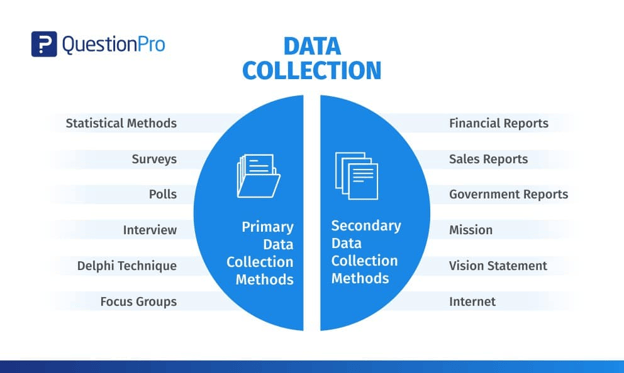
Source: QuestionPro
Utilize tools like Google Analytics and social media insights to gather data on your audience's demographics, behaviors, and preferences. This information can guide decisions on which channels to use, what content to create, and how to optimize your website for conversions. You can also look into other data collection methods such as surveys, polls, interviews, and more.
Remember, a strategic digital marketing plan is not one-size-fits-all, so take the time to truly understand your audience and craft a personalized approach.
Create Brand Positioning
Strategic internet marketing and digital marketing are both centered around the idea of brand positioning because it helps you solidify your digital brand strategy. It is essential to define your brand's value proposition and understand what your target audience wants before creating a digital marketing strategy. This process requires a clear mission statement that responds to the customer's needs.
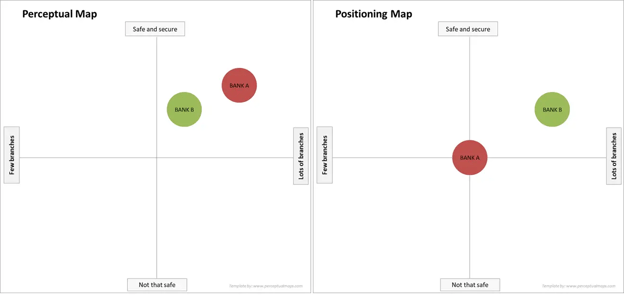
Source: Perceptual Maps
Marketing positioning is about creating a strategy to market a product or service to potential customers and establishing a clear and advantageous place in their minds. The first step towards marketing positioning is analyzing the competition and determining the unique selling point of the product or service. The next step is to develop a responsive website and focus on unique selling points, such as being a veteran-owned company or offering a warranty.
You can use a perceptual or positioning map to see how you can stand out against your competitors. A positioning map accounts for product or service features. Meanwhile, a perception map looks into how audiences perceive you and your competitors. Once you have this information, you would be in a better position to clarify your message and go to the next step of your planning.
Clarify Messaging & Communication Goals
In today's digital age, marketing has evolved significantly. It's crucial to establish clear messaging to succeed in digital marketing. Without clear messaging, your target audience may get confused and end up losing interest in your brand.
Your messaging should be consistent across all channels, including social media, email marketing, and website content. This consistency helps you build trust with your audience and establish a strong brand identity.
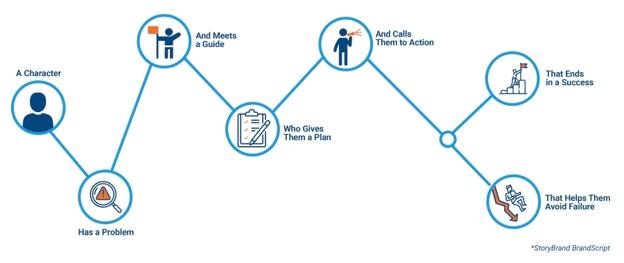
Source: AXIA Public Relations
One of the marketing frameworks you can use for this is the Brandscript Marketing Messaging Framework, which is a powerful tool from a company called Storybrand. Using an 8-step process, you can achieve a clear understanding of the value you provide for your customers.
Clear messaging ensures that your audience understands your products or services and how they can benefit from them. So, take the time to develop effective messaging and watch your digital marketing strategy thrive.
Select Success Metrics And Set Up Measuring Tools
One of the most crucial steps in this process is selecting your success metrics and setting up the tools you need to measure them. By doing so, you'll be able to accurately assess the effectiveness of your marketing efforts and make data-driven decisions to improve your strategy.
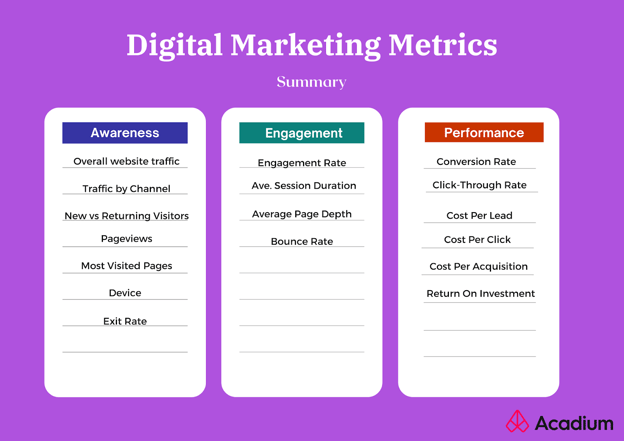
Source: Acadium
First, take some time to carefully consider what success looks like for your business. Is it increased website traffic, higher engagement on social media, or more conversions? Once you've identified your goals, you can select the metrics that will help you measure progress toward achieving them.
Next, it's time to set up the necessary tools for tracking and analyzing your chosen metrics. There are a variety of digital marketing tools available that can help you with this - from Google Analytics for website traffic analysis to social media analytics tools for tracking engagement. By utilizing these tools, you can gain valuable insights into what's working and what's not, and adjust your strategy accordingly.
Identify Relevant Channels
With so many options available, it's easy to get overwhelmed and spread yourself too thin. However, focusing on the channels that are most effective for your business will help you make the most of your efforts and budget.
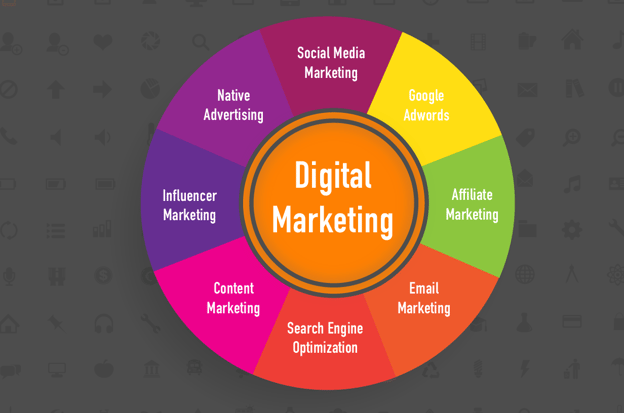
Source: Marketing Guru
Start by analyzing your target audience and figuring out where they spend their time online. Are they active on social media? Do they frequently search for products or services like yours on Google? Are they likely to be receptive to email marketing? Once you have a clear understanding of your audience's online behavior, you can choose the channels that are most likely to reach them.
You also need to consider your digital media strategy. What type of content does your audience like to consume? What channels allow you to showcase those content types most effectively?
Remember, there's no one-size-fits-all approach to digital marketing. What works for one business may not work for another. Experimentation is key, so don't be afraid to try out different channels and tactics until you find what works best for you. And don't forget to regularly evaluate and adjust your strategy as needed. By identifying the relevant channels for your business and adapting as necessary, you can create a digital marketing plan that drives real results.
Plan Workflow
Now that you have a clear idea of what you want to achieve, it's time to focus on the execution. Planning your workflow is essential for achieving success and ensuring that all tasks are completed on time. This involves breaking down your plan into actionable tasks and allocating them to the appropriate team members.
To ensure that your workflow runs smoothly, it's crucial to use a project management tool like Workamajig to track progress, deadlines, and resources. With the right tool, you can easily manage your team's workload, collaborate on projects and monitor progress, even if your team is remote.
Remember that while planning and tracking is essential, execution is king. It's one thing to have a plan in place, but it's another to put it into action. Focus on executing each task with precision and dedication, and you'll be well on your way to achieving your digital marketing goals. Don't be afraid to make adjustments along the way if necessary, as long as you stay focused on the end goal.
Engage With Your Audience
The work doesn't end with just publishing posts. In order to make the most out of your digital presence, you need to actively engage with your audience. This means responding to comments, direct messages, and reviews in a timely and professional manner. By doing so, you show your customers that you value their opinions and feedback, and you build a stronger relationship with them.
Engaging with your audience also gives you the opportunity to gather valuable insights about their needs and preferences. By listening to what they have to say, you can tailor your marketing strategies to better serve their needs and ultimately grow your business. So don't be afraid to start conversations, ask for feedback, and show a genuine interest in your audience.
Remember, social media is a two-way street. It's not enough to just push content out into the world and hope for the best. Take the time to engage with your audience and build a community around your brand. With a little effort and dedication, you'll see the benefits of an engaged audience in no time.
Evaluate Analytics And Optimize
One of the greatest things about digital marketing is its ability to provide quick insights that allow businesses to iterate and adjust their strategies. With digital marketing, you can track and analyze data in real-time, giving you the ability to see what's working and what's not. This allows you to make changes quickly and efficiently, ensuring that your marketing efforts are always on point.
With the ability to track metrics such as website traffic, click-through rates, and conversion rates, you can quickly identify areas that need improvement and make the necessary changes. This iterative approach ensures that your marketing efforts are always evolving and improving, resulting in better ROI and increased revenue.
L the insights provided by digital marketing by staying abreast of trends and insights you receive through your audience engagements and analytics. Use it to optimize your future efforts by iterating quickly to achieve your goals.
Key Elements of a Successful Digital Marketing Strategy
Clear Audience Persona
By understanding your target audience, you can create messaging and content that resonates with them. This, in turn, will help you to build relationships with your customers and increase your brand's visibility.
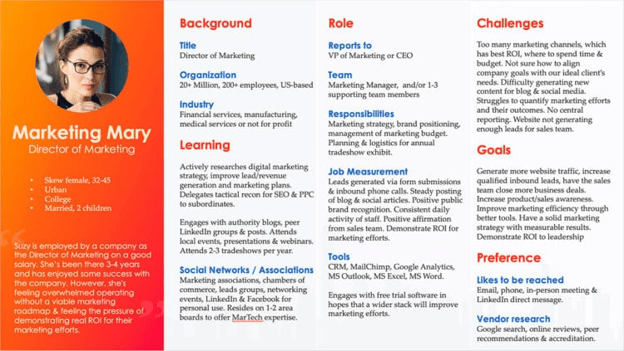
Source: Meticulosity
In today's digital age, where the competition is fierce, creating a clear audience persona can give you a significant advantage. It allows you to get to know your customers on a deeper level and understand what drives them. Once you have this insight, you can tailor your marketing efforts to meet their needs and preferences. It helps you stand out among your competitors and makes your brand more relatable to your target audience.
Engaging And Responsive Information Hub
Having an information hub for your company or service is essential for successful digital marketing. This hub can come in the form of a website, which serves as the main area where your audience can get information on your products or services.
Creating a website with an effective website marketing strategy may seem daunting, but the benefits are worth the effort. Not only does it serve as a central hub for your information, but it also allows you to establish credibility and legitimacy in the eyes of your target audience. You can showcase your expertise and build trust with potential customers by providing valuable and informative content on your website.
Furthermore, having a website opens up opportunities for you to engage with your audience through various channels such as social media and email marketing. By directing traffic to your website, you can create a seamless experience for your audience and ultimately drive conversions.
Differentiated Voice And Visual Brand
With so many businesses vying for attention online, it's crucial to stand out from the crowd and make a memorable impression on your target audience. Your voice and visual brand are key components of your overall brand identity, and they can help you connect with your customers on a deeper level.
Your voice is the tone and personality that comes through in all of your marketing messages, from social media posts to email newsletters. It should be consistent across all channels and should reflect your brand's values and mission. By developing a strong voice, you can create a sense of authenticity and build trust with your audience.
Similarly, your visual brand is the imagery and design elements that represent your brand. This includes your logo, color palette, typography, and any other visual assets you use in your marketing materials. By creating a cohesive visual brand, you can make a strong first impression and help customers recognize your brand across different channels.
Overall, investing in a differentiated voice and visual brand can pay off in big ways for your business. By standing out from the competition and building a strong connection with your audience, you can drive more traffic, leads, and sales through your digital marketing efforts.
Shareable And Engaging Content
When it comes to digital marketing, shareable and engaging content can make all the difference. Shareable content is exactly what it sounds like - content that people want to share with their friends and family on social media and other platforms. This type of content can help increase your brand's visibility and reach, as well as drive traffic to your website.
But shareability isn't the only factor you should be considering when coming up with digital marketing ideas. Engaging content is equally important. Engaging content is content that captures the attention of your audience and keeps them interested and invested in what you have to say. It can be anything from a thought-provoking blog post to a visually stunning infographic or video.
When you combine shareable and engaging content, you have a winning formula for success in digital marketing. By providing value through your content, you can establish yourself as an authority in your industry and create a loyal following of customers eager to learn more from you.
Good Response Time
Customers demand instant gratification. They want their queries to be answered in real-time, and their concerns to be resolved at lightning speed. Therefore, a fast response time has become the bare minimum expectation for businesses to thrive in the market. Whether you are running a small business or a large corporation, responding quickly to your customer's needs is crucial.
Having a fast response time not only increases customer satisfaction but also enhances your brand's reputation. Customers are more likely to recommend your brand to others if they receive prompt and efficient customer service. Moreover, it can also boost your sales and revenue. A satisfied customer is more likely to make repeat purchases, and word-of-mouth recommendations can attract new customers to your business.
Responsiveness To Relevant Trends
With the rapid advancements in technology and changes in consumer behavior, it's essential to keep up with the latest trends and incorporate them into your strategic internet marketing. By doing so, you can ensure that your brand remains relevant and visible to your target audience.
Staying on top of the latest trends can also help you identify new opportunities for growth and innovation. For instance, if you notice that a particular social media platform is gaining more popularity among your target audience, you can leverage it to reach out to more potential customers. Similarly, if you see that video content is becoming more prevalent, you can invest in creating high-quality videos that resonate with your audience.
Being responsive to relevant trends can help you build a more engaged and loyal customer base. By providing your audience with the content they want and need at the right time, you can create a more personalized and meaningful experience for them. This, in turn, can lead to increased customer satisfaction, retention, and advocacy.
Wrapping Up
A robust digital marketing strategy is crucial for the success of any business. It not only helps to increase brand awareness but also allows businesses to connect with their target audience in a more meaningful way.
To create a winning strategic digital marketing, it is essential to take meticulous steps to gather and consolidate insights about your audience, business, and industry. This will help you understand the needs and preferences of your customers, identify gaps in the market, and stay ahead of the competition.
Digital marketing strategy is all about building strong relationships online so they can translate into revenue and growth for your business. By leveraging various digital channels such as social media, email marketing, SEO, PPC advertising, and content marketing, you can reach out to your target audience at every stage of their buying journey. To do this, strategy and execution are key.
Tools like Workamajig can help you ensure that you’re on top of all your tasks and you can churn out content on schedule. Consistent and quality content will help you build trust and credibility with your customers, increase engagement, and drive conversions.
So, if you want to take your business to new heights of success, it's time to invest in a well-crafted digital marketing strategy. With the right mix of tools, tactics, and insights, you can connect with your audience in a more meaningful way and drive revenue growth for your business.
Remember, it's not just about being present online; it's about creating a holistic digital marketing plan that aligns with your business goals and delivers measurable results.

